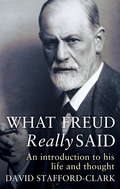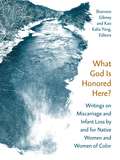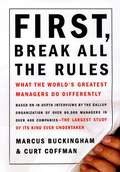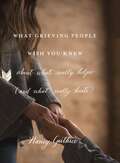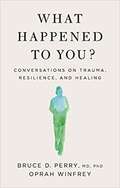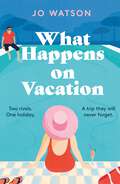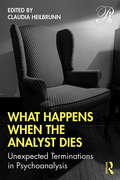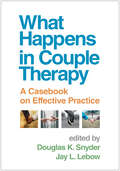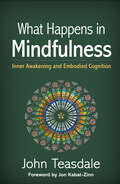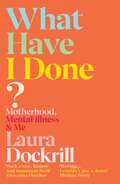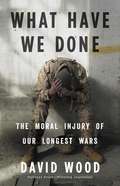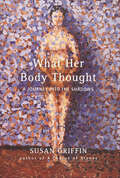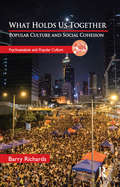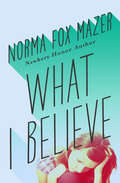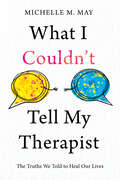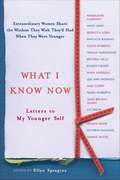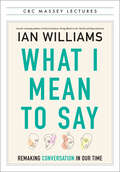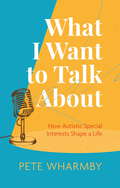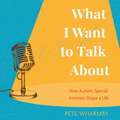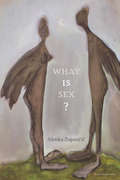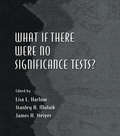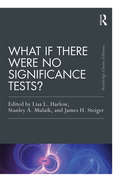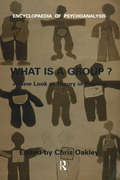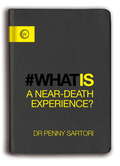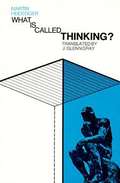- Table View
- List View
What Freud Really Said: An Introduction to His Life and Thought
by David Stafford-Clark Sub Rights IncWhat Freud Really Said offers the most lucid overview available of Sigmund Freud, his legacy, and his place in our world. As the person responsible for the birth of psychoanalysis and one of the sharpest clinical minds of the twentieth century, Freud continues to be one of the most influential thinkers of our time and one of the most controversial. For those interested in understanding the life and work of this seminal figure as well as the current debates that surround them, this book will prove an invaluable guide.
What God Is Honored Here?: Writings on Miscarriage and Infant Loss by and for Native Women and Women of Color
by Kao Kalia Yang Shannon GibneyNative women and women of color poignantly share their pain, revelations, and hope after experiencing the traumas of miscarriage and infant loss What God Is Honored Here? is the first book of its kind—and urgently necessary. This is a literary collection of voices of Indigenous women and women of color who have undergone miscarriage and infant loss, experiences that disproportionately affect women who have often been cast toward the margins in the United States of America. From the story of dashed cultural expectations in an interracial marriage to poems that speak of loss across generations, from harrowing accounts of misdiagnoses, ectopic pregnancies, and late-term stillbirths to the poignant chronicles of miscarriages and mysterious infant deaths, What God Is Honored Here? brings women together to speak to one another about the traumas and tragedies of womanhood. In its heartbreaking beauty, this book offers an integral perspective on how culture and religion, spirit and body, unite in the reproductive lives of women of color and Indigenous women as they bear witness to loss, search for what is not there, and claim for themselves and others their fundamental humanity. Powerfully and with brutal honesty, they write about what it means to reclaim life in the face of death.Editors Shannon Gibney and Kao Kalia Yang acknowledge &“who we had been could not have prepared us for who we would become in the wake of these words,&” yet the writings collected here offer insight, comfort, and, finally, hope for all those who, like the women gathered here, have found grief a lonely place.Contributors: Jennifer Baker, Michelle Borok, Lucille Clifton, Sidney Clifton, Taiyon J. Coleman, Arfah Daud, Rona Fernandez, Sarah Agaton Howes, Honorée Fanonne Jeffers, Soniah Kamal, Diana Le-Cabrera, Janet Lee-Ortiz, Maria Elena Mahler, Chue Moua, Jami Nakamura Lin, Jen Palmares Meadows, Dania Rajendra, Marcie Rendon, Seema Reza, 신 선 영 Sun Yung Shin, Kari Smalkoski, Catherine R. Squires, Elsa Valmidiano.
What Grieving People Wish You Knew about What Really Helps (and What Really Hurts)
by Nancy GuthriePractical and down-to-earth, this short guide will equip you to come alongside a loved one who is hurting and offer comfort in ways that really help.
What Happened To You?: Conversations On Trauma, Resilience, and Healing
by Oprah Winfrey Bruce D. PerryOur earliest experiences shape our lives far down the road, and What Happened to You? provides powerful scientific and emotional insights into the behavioral patterns so many of us struggle to understand. <p><p> Have you ever wondered "Why did I do that?" or "Why can't I just control my behavior?" Others may judge our reactions and think, "What's wrong with that person?" When questioning our emotions, it's easy to place the blame on ourselves; holding ourselves and those around us to an impossible standard. It's time we started asking a different question. <p><p> Through deeply personal conversations, Oprah Winfrey and renowned brain and trauma expert Dr. Bruce Perry offer a groundbreaking and profound shift from asking “What’s wrong with you?” to “What happened to you?” <p><p> Here, Winfrey shares stories from her own past, understanding through experience the vulnerability that comes from facing trauma and adversity at a young age. In conversation throughout the book, she and Dr. Perry focus on understanding people, behavior, and ourselves. It’s a subtle but profound shift in our approach to trauma, and it’s one that allows us to understand our pasts in order to clear a path to our future―opening the door to resilience and healing in a proven, powerful
What Happens On Vacation: The brand-new enemies-to-lovers rom-com you won't want to go on holiday without!
by Jo WatsonTwo rivals. One holiday. A trip they will never forget.Jo Watson returns with a hilarious and heartfelt new enemies-to-lovers, forced-proximity rom-com! It's the book you won't want to go on holiday without! Perfect for fans of Emily Henry, Beth O'Leary and Christina Lauren..........................................Journalist Margaret needs a vacation. After a difficult couple of years, some R&R is on the cards, and she's taking her mom with her. Luckily, the office Quiz Night is coming up and the prize is an all-expenses-paid trip to Zanzibar. Good thing Margaret has never met a quiz question she didn't like. But Margaret has also never played against Jagger Villain. For the last six months, they have shared a desk and not a day has gone by when he hasn't driven her to distraction. The idea of sharing anything else with Jagger is unthinkable. But if she's going get what she needs from this trip, Margaret might have to compromise. Away from the office and in a tropical paradise, Margaret beings to wonder if her archnemesis maybe has some qualities. Could the holiday from hell turn into the vacation of her dreams? .........................................Love funny, romantic stories? You don't want to miss Jo Watson:'The perfect choice for fans of romantic comedies' Gina's Bookshelf'It was amazing, it was hilarious' Rachel's Random Reads'A brilliant read from beginning to end' Hopeless Romantics'Sitting here open mouthed in disbelief at just how wonderful this book is' Rachel's Random Reads'A stunning heart-warming read' Donna's Book Blog
What Happens When the Analyst Dies: Unexpected Terminations in Psychoanalysis (Psychoanalysis in a New Key Book Series)
by Claudia HeilbrunnWhat Happens When the Analyst Dies explores the stories of patients who have experienced the death of their analyst. The book prioritizes the voices of patients, letting them articulate for themselves the challenges and heartache that occur when grappling with such a devastating loss. It also addresses the challenges faced by analysts who work with grieving patients and/or experience serious illness while treating patients. Claudia Heilbrunn brings together contributors who discuss their personal experiences with bereavement and/or serious illness within the psychoanalytic encounter. Chapters include memoirs written by patients who describe not only the aftermath of an analyst’s death, but also how the analyst’s ability or inability to deal with his or her own illness and impending death within the treatment setting impacted the patient’s own capacity to cope with their loss. Other chapters broach the challenges that arise (1) in ‘second analyses’, (2) for the ill analyst, and (3) for those who face the death of an analyst or mentor while in training. Aiming to give prominence to the often neglected and unmediated voices of patients, as well as analysts who have dealt with grieving patients and serious illness, What Happens When the Analyst Dies strives to highlight and encourage discussion about the impact of an analyst’s death on patients and the ways in which institutes and therapists could do more to protect those in their care. It will be of interest to psychoanalysts, psychotherapists, counselors, gerontologists, trainees, and patients who are currently in treatment or whose therapist has passed away.
What Happens in Couple Therapy: A Casebook on Effective Practice
by Jay L. Lebow Douglas K. SnyderBringing contemporary couple therapy to life, this casebook candidly illustrates the "whats," "whys," and "how-tos" of leading clinical approaches. Well-known contributors provide a window into their work with couples seeking help for a variety of relationship challenges. Cases depict the moment-by-moment process of therapy, from the initial assessment and case formulation through the beginning, intermediate, and concluding phases. Themes addressed include working across cultural divides; helping couples living with psychological or medical disorders; and treating interfaith couples, military couples, and same-sex and queer couples. Enhancing the book's utility for course use, the expert editors concisely introduce each case and describe how the approach fits into the broader field. See also Lebow and Snyder's Clinical Handbook of Couple Therapy, Sixth Edition, which provides an authoritative overview of theory and practice.
What Happens in Mindfulness: Inner Awakening and Embodied Cognition
by John TeasdaleWell known for applying mindfulness to the treatment of depression, pioneering researcher John Teasdale now explores the broader changes that people can experience through contemplative practices. What goes on in our minds when we are mindful? What does it mean to talk of mindfulness as a way of being? From a scientific perspective, how do core elements of contemplative traditions have their beneficial effects? Teasdale describes two types of knowing that human beings have evolved--conceptual and holistic–intuitive--and shows how mindfulness can achieve a healthier balance between them. He masterfully describes the mechanisms by which this shift in consciousness not only can reduce emotional suffering, but also can lead to greater joy and compassion and a transformed sense of self.
What Have I Done?: An honest memoir about surviving postpartum psychosis
by Laura Dockrill'Such a raw, honest and important book' Giovanna FletcherLike any new mum, Laura Dockrill felt rather overwhelmed after the birth of her son. But a slow recovery, sleep deprivation and anxiety quickly escalated into postpartum psychosis, and she had to spend a fortnight in a psych ward, separated from her family. It was only when Laura began to put her ordeal into words that she began to find herself again, and recovery seemed within reach.This is Laura's raw, honest and life-affirming story of how she made it through one of the most frightening experiences a mother can face. Now, she wants to break down the silence around postnatal mental health, shatter the idealised expectations of perfect motherhood, and show all new struggling parents that they are not alone.'A book to save a whole generation of women' AdeleA pleasure to read...I didn't want to put it down. If anyone is going through a similar experience it will make them feel less alone' Philippa Perry'A humbingly honest and human war report from the front lines of mothering psychosis and recovery; there is no other book like it' Caitlin Moran'An incredibly powerful book' Jessie Ware'This book will give women and their families confidence that the brain and body will heal' Dr Jessica Heron, CEO of Action on Postpartum Psychosis'An amazing read' Fiona Telford, postpartum psychosis survivor
What Have We Done: The Moral Injury of Our Longest Wars
by David WoodFrom Pulitzer Prize-winning journalist David Wood, a battlefield view of moral injury, the signature wound of America's 21st century wars. Most Americans are now familiar with Post Traumatic Stress Disorder (PTSD) and its prevalence among troops. In this groundbreaking new book, David Wood examines the far more pervasive yet less understood experience of those we send to war: moral injury, the violation of our fundamental values of right and wrong that so often occurs in the impossible moral dilemmas of modern conflict. Featuring portraits of combat veterans and leading mental health researchers, along with Wood's personal observations of war and the young Americans deployed in Iraq and Afghanistan, WHAT HAVE WE DONE offers an unflinching look at war and those who volunteer for it: the thrill and pride of service and, too often, the scars of moral injury.Impeccably researched and deeply personal, WHAT HAVE WE DONE is a compassionate, finely drawn study of modern war and those caught up in it. It is a call to acknowledge our newest generation of veterans by listening intently to them and absorbing their stories; and, as new wars approach, to ponder the inevitable human costs of putting American "boots on the ground."
What Her Body Thought: A Journey Into the Shadows
by Susan GriffinIn this boldly intimate and intelligent blend of personal memoir, social history, and cultural criticism, Susan Griffin profoundly illuminates our understanding of illness. She explores its physical, emotional, spiritual, and social aspects, revealing how it magnifies our yearning for connection and reconciliation.Griffin begins with a gripping account of her own harrowing experiences with Chronic Fatigue and Immune Dysfunction Syndrome (CFIDS), a potentially life-threatening illness that has been misconstrued and marginalized through the label "psychosomatic." Faced with terrifying bouts of fatigue, pain, and diminished thinking, the shame of illness, and the difficulty of being told you are "not really ill," she was driven to understand how early childhood loss made her susceptible to disease.Alongside her own story, Griffin weaves in her fascinating interpretation of the story of Marie du Plessis, popularized as the fictional Camille, an eighteenth-century courtesan whose young life was taken by tuberculosis. In the old story, Griffin finds contemporary themes of "money, bills, creditors, class, social standing, who is acceptable and who not, who is to be protected and who abandoned." In our current economy, she sees "how to be sick can impoverish, how poverty increases the misery of sickness, and how the implicit violence of this process wounds the soul as well as the body."Griffin insists that we must tell our stories to maintain our own integrity and authority, so that the sources of suffering become visible and validated. She writes passionately of a society where we are all cared for through "the rootedness of our connections. How the wound of being allowed to suffer points to a need to meet at the deepest level, to make an exchange at the nadir of life and death, the giving and taking which will weave a more spacious fabric of existence, communitas, community." Her views of the larger problems of illness and society are deeply illuminating.
What Holds Us Together: Popular Culture and Social Cohesion
by Barry RichardsFaced by the increasing divisiveness and volatility of electoral politics, and the rise of illiberal fundamentalisms, the social sciences may seem to lack the imagination necessary to make sense of the world. In this unusual book of political psychology, based on the idea that we hold ourselves together through a combination of restraint and release, the author draws on psychoanalysis and its creative interpretations of everyday experience to consider the current malaise of politics in relation to the huge vitality of popular culture. In a wide-ranging analysis, that links topics as diverse as our experience of public utilities, the rise of counselling, and the weakened impact of sexual scandal, he concludes with the proposal that a reconstruction of nationalism could make an important contribution to the renewal of democratic politics.
What I Believe
by Norma Fox MazerVicki wishes she could solve her problems as easily as she can arrange words into a poem Vicki Marnet has two wonderful big brothers who are completely regular people. They like sports, chess, and the student senate, and are totally normal--unlike Vicky, who feels in her heart that she's different. For one thing, she writes poetry for fun. She plays with sonnets, pantoums, sestinas--all kinds of stanzas and rhymes, anything to take her mind off what's happening at home. Vicki's dad lost his job, and since he can't find another one, her family is moving to the city. They're selling their big house, moving into a tiny apartment, and facing troubles that Vicki has never known before. Ashamed and slow to make friends at her new school, Vicki puts her thoughts down in verse as she makes a new place for herself--one that's very much her very own.
What I Couldn’t Tell My Therapist: The Truths We Told to Heal Our Lives
by Michelle M. MayWhat I Couldn't Tell My Therapist shares the unforgettable stories of three patients in intensive therapy. Michelle, a dedicated psychotherapist, struggles with an addiction to people-pleasing and perfectionism while being tethered to opioids by mysterious chronic pain. After her own transformative odyssey, Michelle helps two troubled patients, Walter and Emma. Walter confronts the shadows of crippling depression and an intimate attachment to cannabis, while Emma yearns for a relationship but is stymied by her haunting fear of vulnerability. Within the sacred confines of intensive therapy sessions, their stories intertwine, creating a sanctuary for profound revelation. Through these stories, the profound truth emerges--that the unspoken holds the power to shape our healing journey. What I Couldn't Tell My Therapist serves as a testament to the power of intensive therapy, inviting us to confront the depths of our unspoken truths and unlock the hidden pathways to profound transformation.
What I Know Now: Letters to My Younger Self
by Ellyn SpraginsIn this book, forty-one famous women write letters to the women they once were, filled with advice and insights they wish they had had when they were younger. Their letters contain rare glimpses into the personal lives of extraordinary women.
What I Mean to Say: Remaking Conversation in Our Time (The CBC Massey Lectures)
by Ian WilliamsEnough small talk. Let’s get right to it: Why can’t we talk to each other anymore? What makes good communication? And how do we restore the lost art of conversation? In contemporary society, much of our communication exists in a new dimension, the online space, and it’s changing how we regard each other and how we converse. In the digital realm, we can be anonymous, we can make false and hurtful comments yet evade consequences in a hurried scroll of clicks and swipes. But a good conversation takes time and patience, courage, even. We need to realize that one-half of our conversations is, in fact, listening. And aren't the best conversationalists—like the best musicians—good listeners? With What I Mean to Say, award-winning novelist and poet Ian Williams seeks to ignite a conversation about conversation, to confront the deterioration of civic and civil discourse, and to reconsider the act of conversing as the sincere, open exchange of thoughts and feelings. Alternately serious and playful, Williams nimbly leaps between topics of discussion and, along the way, is discursive, digressive, and endlessly generous—like any great conversationalist.
What I Want to Talk About: How Autistic Special Interests Shape a Life
by Pete Wharmby'This book isn't a memoir. It is a love letter to the phenomenon of autistic hyperfixation.'In What I Want to Talk About popular autism advocate Pete Wharmby takes readers on a journey through his special interests, illuminating the challenges of autistic experience along the way. Funny, revealing, celebratory and powerful in equal measure, this is a book that will resonate with many, and which should be required reading for anyone who wants to understand autism with more accuracy and empathy.
What I Want to Talk About: How Autistic Special Interests Shape a Life
by Pete Wharmby'This book isn't a memoir. It is a love letter to the phenomenon of autistic hyperfixation.'A fascinating exploration of the autistic experience from leading advocate, Pete Wharmby. In What I Want to Talk About popular autism advocate Pete Wharmby takes listeners on a journey through his special interests, illuminating the challenges of autistic experience along the way. Funny, revealing, celebratory and powerful in equal measure, this is an audiobook that will resonate with many, and which should be required listening for anyone who wants to understand autism with more accuracy and empathy.(P)2022 Hodder & Stoughton Limited
What IS Sex? (Short Circuits)
by Alenka ZupancicWhy sexuality is at the point of a “short circuit” between ontology and epistemology.Consider sublimation—conventionally understood as a substitute satisfaction for missing sexual satisfaction. But what if, as Lacan claims, we can get exactly the same satisfaction that we get from sex from talking (or writing, painting, praying, or other activities)? The point is not to explain the satisfaction from talking by pointing to its sexual origin, but that the satisfaction from talking is itself sexual. The satisfaction from talking contains a key to sexual satisfaction (and not the other way around)—even a key to sexuality itself and its inherent contradictions. The Lacanian perspective would make the answer to the simple-seeming question, “What is sex?” rather more complex. In this volume in the Short Circuits series, Alenka Zupančič approaches the question from just this perspective, considering sexuality a properly philosophical problem for psychoanalysis; and by psychoanalysis, she means that of Freud and Lacan, not that of the kind of clinician practitioners called by Lacan “orthopedists of the unconscious.” Zupančič argues that sexuality is at the point of a “short circuit” between ontology and epistemology. Sexuality and knowledge are structured around a fundamental negativity, which unites them at the point of the unconscious. The unconscious (as linked to sexuality) is the concept of an inherent link between being and knowledge in their very negativity.
What If There Were No Significance Tests?: Classic Edition (Multivariate Applications Ser.)
by Lisa L. Harlow Stanley A. Mulaik James H. SteigerThis book is the result of a spirited debate stimulated by a recent meeting of the Society of Multivariate Experimental Psychology. Although the viewpoints span a range of perspectives, the overriding theme that emerges states that significance testing may still be useful if supplemented with some or all of the following -- Bayesian logic, caution, confidence intervals, effect sizes and power, other goodness of approximation measures, replication and meta-analysis, sound reasoning, and theory appraisal and corroboration. The book is organized into five general areas. The first presents an overview of significance testing issues that sythesizes the highlights of the remainder of the book. The next discusses the debate in which significance testing should be rejected or retained. The third outlines various methods that may supplement current significance testing procedures. The fourth discusses Bayesian approaches and methods and the use of confidence intervals versus significance tests. The last presents the philosophy of science perspectives. Rather than providing definitive prescriptions, the chapters are largely suggestive of general issues, concerns, and application guidelines. The editors allow readers to choose the best way to conduct hypothesis testing in their respective fields. For anyone doing research in the social sciences, this book is bound to become "must" reading.
What If There Were No Significance Tests?: Classic Edition (Multivariate Applications Series)
by Lisa L. Harlow Stanley A. Mulaik James H. SteigerThe classic edition of What If There Were No Significance Tests? highlights current statistical inference practices. Four areas are featured as essential for making inferences: sound judgment, meaningful research questions, relevant design, and assessing fit in multiple ways. Other options (data visualization, replication or meta-analysis), other features (mediation, moderation, multiple levels or classes), and other approaches (Bayesian analysis, simulation, data mining, qualitative inquiry) are also suggested. The Classic Edition’s new Introduction demonstrates the ongoing relevance of the topic and the charge to move away from an exclusive focus on NHST, along with new methods to help make significance testing more accessible to a wider body of researchers to improve our ability to make more accurate statistical inferences. Part 1 presents an overview of significance testing issues. The next part discusses the debate in which significance testing should be rejected or retained. The third part outlines various methods that may supplement significance testing procedures. Part 4 discusses Bayesian approaches and methods and the use of confidence intervals versus significance tests. The book concludes with philosophy of science perspectives. Rather than providing definitive prescriptions, the chapters are largely suggestive of general issues, concerns, and application guidelines. The editors allow readers to choose the best way to conduct hypothesis testing in their respective fields. For anyone doing research in the social sciences, this book is bound to become "must" reading. Ideal for use as a supplement for graduate courses in statistics or quantitative analysis taught in psychology, education, business, nursing, medicine, and the social sciences, the book also benefits independent researchers in the behavioral and social sciences and those who teach statistics.
What Is A Group?: A New Look at Theory in Practice (The Encyclopaedia of Psychoanalysis)
by Chris OakleyThis volume on groups emphasises the importance of a psychoanalytic analysis, as opposed to a behaviourist account. Work by Foulkes and Bion is reconsidered in the light of current clinical practice by Robin Cooper and Michael Halton, and the American scene is represented through an essay by Otto Kernberg, using Freud's work on group psychology.
What Is A Near Death Experience?
by Dr Penny SartoriDeath is the only certainty in life yet many people shy away from thinking about it until something drastic happens such as the diagnosis of a life-threatening illness, or the sudden death of a loved one, which can throw us into turmoil. Yet, paradoxically, contemplating death and the frequently-experienced phenomenon of near-death experiences (NDEs) - which are so little recognised and supported within the traditional medical environment - can really help alter our relationship with death and release us from the fear that often surrounds it.After an insightful introduction about why the subject of NDEs is so worth exploring, each chapter in this book addresses a key question: What are the Characteristics of an NDE, and are there different types? Are all NDE experiences pleasant, or can some be distressing? Who has NDEs and under what circumstances do they occur? How do they affect the people who have them, and how can this change their lives? How can NDEs be scientifically explained - aren't they just hallucinations? What can we learn from NDEs, and can they change our attitude to life and death? Can a greater understanding of NDEs lead to an evolution in our consciousness and an enhanced sense of spirituality?As such, this book really brings readers on an exploratory journey through the world of NDEs, challenging preconceptions about what they are and the impact they can have, encouraging us to accept and feel empowered by death, rather than living in fear of it, and giving us useful insights about life along the way.From the Trade Paperback edition.
What Is Called Thinking?
by Martin Heidegger J. Glenn Gray Fred D. Wieck"For an acquaintance with the thought of Heidegger, What Is Called Thinking? is as important as Being and Time. It is the only systematic presentation of the thinker's late philosophy and . . . it is perhaps the most exciting of his books."--Hannah Arendt
